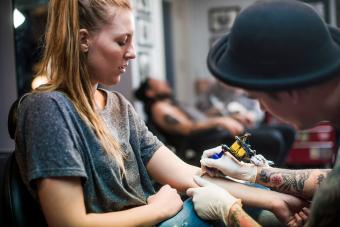
If you have a skin condition, you'll have some additional considerations to keep in mind if you want to get a tattoo. Some skin conditions, like psoriasis, can make tattooing nearly impossible. Psoriasis can be triggered by injury to the skin - such as the needle wounds you'll experience when you get inked.
If you've been diagnosed with psoriasis or if you're at risk for the condition, it's important that you some research before stepping into the tattoo parlor. One of the most important steps is to talk with your dermatologist and tattoo artists to help reduce any potential risks.
Potential Concerns When Getting a Tattoo With Psoriasis
Just because you have been diagnosed with psoriasis, it does not mean that you can't get a tattoo. According to the National Psoriasis Foundation, the skin condition isn't stopping people from getting inked. The source notes that tattoo can be a powerful way to express a healthy body image and that can be important to those with psoriasis - even considering the fact that risks may be involved.
The Journal of Medicine and Life (JML) also provides insights on how psoriatic skin reacts to the tattoo gun, based on a case study involving an 18-year-old man with scalp psoriasis. Both sources suggest that you get fully informed before getting a tattoo with psoriasis.
Possible Skin Lesions
One of the major issues with tattoos and psoriasis is the Koebner effect or the Koebner phenomenon, according to JML. Koebner was a German dermatologist who first discovered that new skin lesions can occur when skin is damaged, especially in those with certain skin conditions. According to study authors, the Koebner phenomenon occurs in about 25% of people with psoriasis after various traumatic injuries, including tattooing. So not all psoriasis sufferers will have to deal with this side effect. However, it is very difficult to predict.
Infection
There is always a risk of infection if you get a tattoo in the wrong setting. Nicolas Kluger, M.D., Ph.D., senior dermatologist in the Department of Dermatology of the Helsinki University Hospital in Finland, told the National Psoriasis Foundation that "a tattoo done in non-hygienic conditions can [lead to] an infection." He adds that regret is another concern.
While there is nothing you can do about regret, you can choose your tattoo artist wisely. Industry experts advise that you ask about training before setting up an appointment and also review the shop's compliance and safety standards.
Legal Rules
In some states, it is not legal for a tattoo artist to work on a person who has an active psoriasis outbreak. When you go into the tattoo shop, you may have to sign a waiver that confirms that you do not "have medical skin conditions such as, but not limited to: acne, scarring (keloid), eczema, psoriasis, freckles, moles or sunburn in the area to be tattooed." Even if you sign the waiver, if your tattoo artist sees an active outbreak, they may not be willing to do the art.
Limited Placement Options
When considering getting a tattoo with psoriasis, it's important to think of only areas of clear skin without an active flare-up. Journal of the European Academy of Dermatology and Venerology notes you want to consider the best time for tattooing and the safest location for tattoos. Tattoos during an active flare-up of psoriasis carry the most risk.
Precautions to Reduce Skin Reactions With Tattoos
Not everyone with psoriasis will have a reaction when getting inked. However, there is no way to predict what will happen.
Consider the following before you head to the tattoo shop:
- Family history. Has any relative had psoriasis and also tried a tattoo? Their experience may give you some hints of what yours could be.
- Current skin reactions. What causes your psoriasis to flare up? If you cut yourself with a razor while shaving, does your skin react? If so, it is likely to do the same with the tattoo gun.
- Severity of the condition. The more severe your condition, the more likely your skin will negatively react to a tattoo. For example, if you are currently having a flare-up or taking medications because the disease is active, it might make tattooing more complicated.
Lastly and most importantly, f you have psoriasis, be sure to consult your dermatologist or other healthcare professional before getting inked. They will know your history and provide a more personalized guide to the potential for a negative reaction. Tattoo artists are not medically trained, and while they do have some intimate knowledge of the skin, cannot predict how your body will react. Psoriasis can be serious, so it is important to have a discussion with your skin professional before getting that tattoo.







